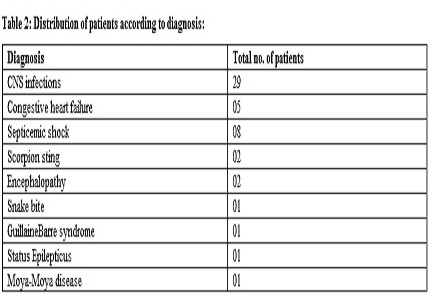The prevalence of hyperglycemia in critically ill children admitted in PICU
Abstract
Background: Stress hyperglycemia is mainly due to increased gluconeogenesis and glycogenolysis & insulin resistance. Longer duration of hyperglycemia during hospital stay is known to have adverse outcome.
Aim of Study: To study the prevalence of hyperglycemia and its association with PICU mortality and morbidity in terms of duration of PICU stay.
Design: Prospective Observational study.
Method: All critically ill children belonging to age group of 1 month to 14 years, admitted in PICU from 1st May 2011 to 15th September 2011 over a period of four and a half months. Children were followed throughout their hospital stay and outcome in terms of mortality and duration of PICU stay were noted. Blood glucose levels weredone every 3 hourly during the first 48 hours of PICU admission. Highest blood glucose level in the first 48 hours was defined as the peak glucose level. The mean of glucose values of first 24 and first 48 hours were calculated.
Result: Prevalence of hyperglycemia was 58%. Mortality rate was higher in the hyperglycemic patients (56%) as compared to normoglycemics (14%) and overall mortality (36%). The p value for difference in the mean of peak RBS and 24 hours mean RBS of the non-survivors and survivors was <0.005 and hence significant.
Statistical Analysis: Independent student t test used for analysis.
Conclusion: Hyperglycemia during first 24 hours of PICU admission was associated with higher mortality rate and longer duration of PICU stay.
Downloads
References
2. Marik PE. Glycemic control in critically ill patients: What to do post NICE-SUGAR? World J Gastrointest Surg. 2009 Nov 30;1(1):3-5. doi: 10.4240/wjgs.v1.i1.3. [PubMed]
3. Van den Berghe G. How does blood glucose control with insulin save lives in intensive care? J Clin Invest. 2004 Nov;114(9):1187-95. [PubMed]
4. Roger’s textbook on Intensive Pediatric Care-4th edition-1605-1614. [PubMed]
5. van den Berghe G, Wouters P, Weekers F, Verwaest C, Bruyninckx F, Schetz M, Vlasselaers D, Ferdinande P, Lauwers P, Bouillon R. Intensive insulin therapy in critically ill patients. N Engl J Med. 2001 Nov 8;345(19):1359-67. [PubMed]
6. Srinivasan V, Spinella PC, Drott HR, Roth CL, Helfaer MA, Nadkarni V. Association of timing, duration, and intensity of hyperglycemia with intensive care unit mortality in critically ill children. Pediatr Crit Care Med. 2004 Jul;5(4):329-36. [PubMed]
7. Faustino EV, Apkon M. Persistent hyperglycemia in critically ill children. J Pediatr. 2005 Jan;146(1):30-4. [PubMed]
8. Hirschberg E, Larsen G, van Duker H: Alterations in glucose homeostasis in the pediatric intensive care unit : hyperglycemia and glucose variability are associated with increased mortality and morbidity: Pediatric Critical Care Medicine:2008:9: 361-366.
9. Kandil SB, Spear D, Thomas NJ, Weinzimer SA, Faustino EV. Retrospective outcomes of glucose control in critically ill children. J Diabetes Sci Technol. 2013 Sep 1;7(5):1220-8. [PubMed]
10. Ranjit S. Hyperglycemia in the pediatric intensive care unit: Innocent bystander or villain of the piece? Indian J Crit Care Med. 2014 Jan;18(1):6-7. doi: 10.4103/0972-5229.125424. [PubMed]

Copyright (c) 2016 Author (s). Published by Siddharth Health Research and Social Welfare Society

This work is licensed under a Creative Commons Attribution 4.0 International License.


 OAI - Open Archives Initiative
OAI - Open Archives Initiative


